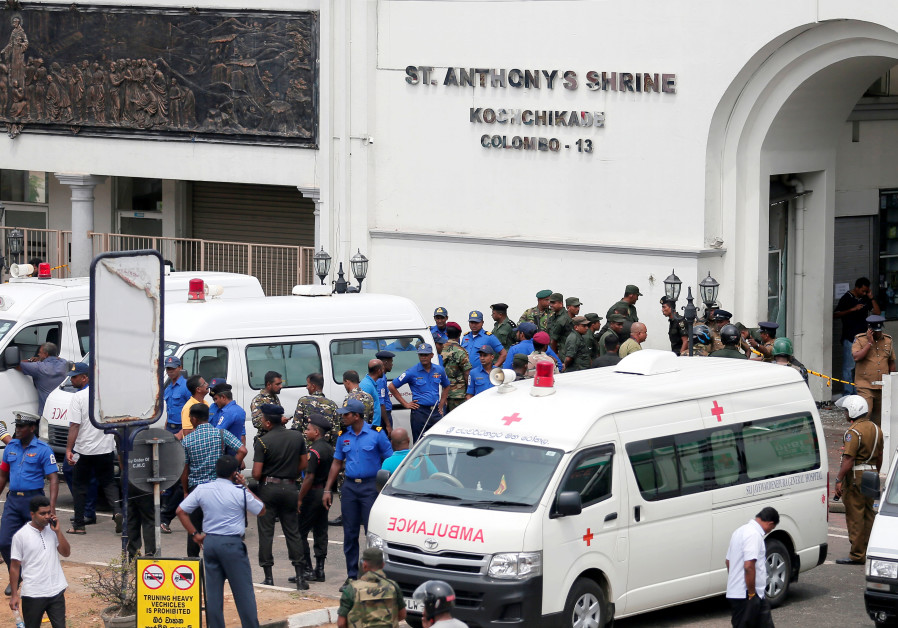Sri Lanka terrorism has hallmarks of previous attacks

Sri Lankan military officials stand guard in front of the St. Anthony’s Shrine, Kochchikade church after an explosion in Colombo, Sri Lanka April 21, 2019. (photo credit: REUTERS/DINUKA LIYANAWATTE)
A coordinated series of attacks on churches and hotels in Sri Lanka conjures up memories of previous terrorist attacks. Striking at worshipers at prayer reminds us of the Christchurch Mosque shootings in New Zealand on March 15. It also appears linked to previous Easter attacks, including the 2017 Palm Sunday assault in Egypt in 2017 in which 45 people were murdered, and the terrorist attack in Lahore in 2016 that killed 75. In coordination and the number of sites chosen it is also similar to the 2008 Mumbai attacks that killed 166.
It is a hallmark of our era that when it comes to mass murder and coordinated terror attacks we have a long list of past experiences to choose from. In the last decades the growing number of terrorist attacks by far-right Islamist extremists, white nationalists and others has become an almost daily event. Last week gunmen, allegedly terrorists from Iran, murdered 14 people in western Pakistan in an attack on Pakistani security forces. Earlier in April, a bombing attack – not widely reported outside Pakistan and thought to be carried out by the Islamic State – targeted Shi’ites in Quetta. And on Friday there was an attack made on government institutions in Kabul.
Not all attacks are the same. The ones in Pakistan and Afghanistan specifically struck at the military and government. The one in Quetta targeted minorities. But there are methods that are similar, and there are networks of groups which learn from each other, specifically ISIS and its affiliates. ISIS has built upon decades of experience gained from al-Qaeda, and other groups that have perfected their methods.
The full picture of the Sri Lankan attacks is not clear. Pakistan’s spokesman for its Ministry of Foreign Affairs released a statement in the afternoon condemning the “terrorist attacks in Sri Lanka.” Pakistan says it stands with Sri Lanka.
Sri Lanka has a long history fighting terrorism. It was generally fighting against Liberation Tigers of Tamil Eelam, a separatist movement that was largely defeated in 2009. The Tamil fighters were rooted in the Tamil Hindu minority of the Buddhist-majority Sri Lanka. Christians make up only around 8% of the country, and Muslims an additional 12%. In 2016, Sri Lanka revealed that 32 Sri Lankans had joined ISIS and left the country. Many were said to be from educated families, something that surprised authorities. The local Muslim community condemned the government’s statements as “tarnishing the image” of Sri Lankan Muslims. An Australian member of ISIS was similarly shown to have a respected uncle back home in Sri Lanka. Other reports indicated ISIS members in India had connections to Sri Lanka, and there were concerns after the defeat of ISIS about returnees from the terrorist group. This appears similar to the extremism in Bangladesh before the 2016 Dhaka attack that was carried out by educated ISIS members who targeted foreigners in a café.
While Easter attacks are carried out by Islamist extremist groups, including the ones in Pakistan and Egypt already mentioned, and an attack in Iraq in 2011, the complex and coordinated nature of the attack in Sri Lanka looks more like those in Mumbai in 2008. In that year, 12 coordinated bombings and shooting attacks were perpetrated across Mumbai, including at a café, the Taj Mahal Palace Hotel, the Oberoi Trident Hotel, and at a Jewish site, the local Chabad house. That attack was coordinated by Lashkar-e-Taiba in Pakistan. Unlike the bombings in Sri Lanka, the attack was carried out by gunmen.
The attacks in Sri Lanka struck three churches: St. Sebastian’s Church in Negombo, St. Anthony’s Shrine in Colombo and Batticaloa’s Zion Church, according to Pakistan’s The Dawn newspaper. Police initially estimated that only 20 were killed but soon revised that number to 137, with 45 murdered in Colombo, 25 in Batticaloa, and 67 in Negombo. Three major hotels were struck in Colombo, all of them in a line along a major road that links several important central districts of the city. These included the Cinnamon Grand, Shangri-La and Kingsbury.
Police Chief Pujuth Jayasundara had reportedly warned in April about a threat of attacks targeting churches and the Indian High Commission office, near the hotels that were targeted. In his security notice he had pointed to a local Islamic group. But it isn’t entirely clear if the police chief was convinced there was a threat, as security did not appear to be increased before Easter, the most high-profile holiday to follow.
After the attack in New Zealand, there has been heightened awareness of the threat of attacks on religious institutions and people at prayer. The outpouring of support in the wake of the Christchurch massacre is a lesson for Sri Lanka about the kind of support it will now need. If the death toll is as high as initial reports indicate, this attack will be one of the worst of its kind in recent memory. But these kinds of attacks have become more normal in recent years. Governments have not found a way to prevent them, even with the latest technology and intelligence sharing.
Join Jerusalem Post Premium Plus now for just $5 and upgrade your experience with an ads-free website and exclusive content. Click here>>






Comments are closed.